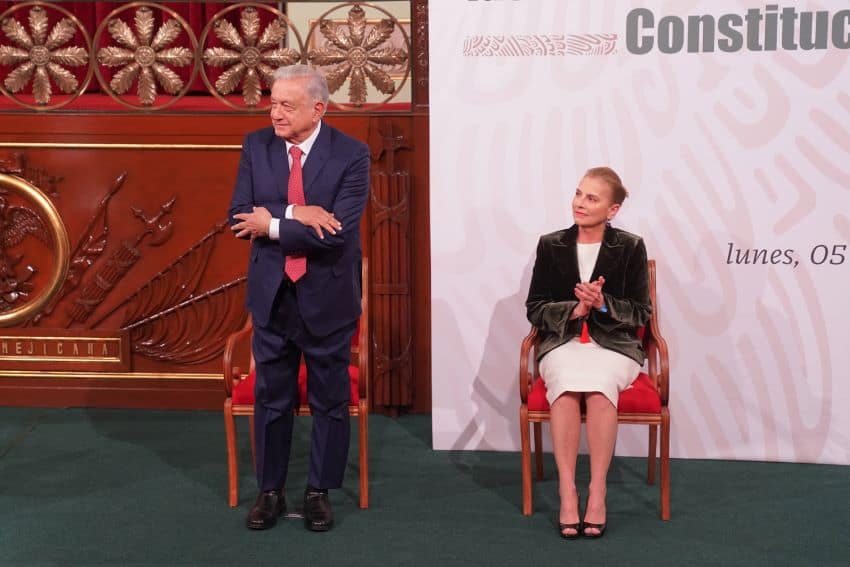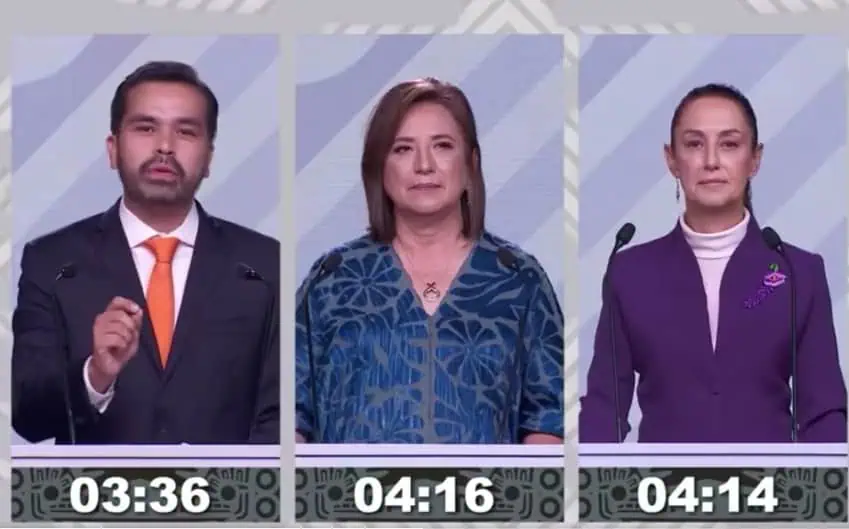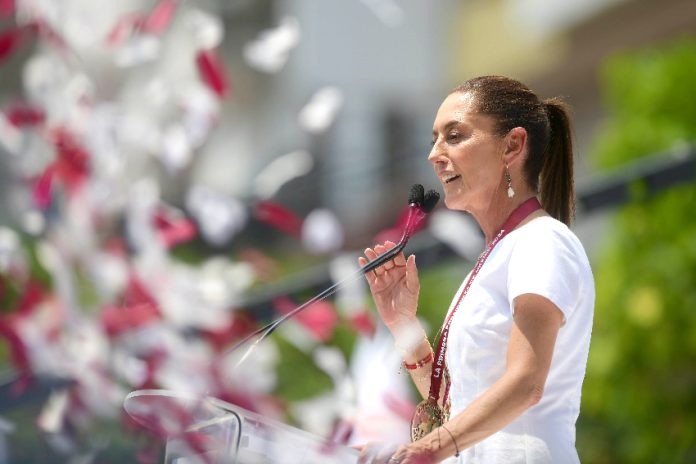If the polls are right, there is little doubt that Mexicans will elect Claudia Sheinbaum as the country’s first female president this Sunday.
Separate poll results published by major newspapers this week all showed the ruling Morena party candidate with a commanding lead over Xóchitl Gálvez of the Strength and Heart for Mexico (PAN-PRI-PRD) opposition bloc and Jorge Álvarez Máynez of the Citizens Movement (MC) party.

Excluding undecided voters, El Universal found that Sheinbaum has a 20-point (54%-34%) lead over Gálvez, while Reforma also detected a 20-point advantage (55%-35%) for the Morena candidate, who is also backed by the Labor Party (PT) and the Ecological Green Party of Mexico (PVEM)
Eligible voters polled by El País and El Economista expressed support for Sheinbaum in even greater numbers.
El País found that the former Mexico City mayor has a 23-point lead (56-33%) over Gálvez, a former National Action Party (PAN) senator, while El Economista detected an even bigger 25.7-point (56.9%-31.2%) lead for the Morena candidate.
Support for Álvarez Máynez in the four polls ranged from 10% to 12%.

While there have been some fluctuations in poll numbers during the three-month-long campaign period, one constant has been Sheinbaum’s clear advantage over Gálvez in all the major polls.
Even more evidence of the Morena party candidate’s status as the clear frontrunner is provided by Expansión Política’s “Poll of Polls,” which shows Sheinbaum 19 points (53%-34%) ahead of Gálvez, and Bloomberg’s “Electoral Barometer,” which has Sheinbaum 24.8 points (57%-32-2%) points clear of her main rival.
According to Expansión Política, Sheinbaum has a 98% probability of winning the presidential election this Sunday.
The congressional contest
Mexicans will also vote on Sunday to renew both house of federal Congress. Up for grabs are 500 seats in the Chamber of Deputies and 128 positions in the Senate.
A two-thirds majority in both houses of Congress is coveted, as it enables the approval of constitutional reform proposals without the need to negotiate with opposition parties.
If Morena and its allies were to win supermajorities, Sheinbaum — if elected president — would be able to enact constitutional reform proposals she supports, a package of which has already been submitted to Congress by President Andrés Manuel López Obrador.
In its poll, Reforma asked 1,000 eligible voters across the country which party they intended to vote for in the Chamber of Deputies election.

Morena, which was founded by López Obrador, was nominated by 44% of respondents, more than double the number of people who expressed support for the second most popular party, the PAN.
An additional 6% of respondents said they would vote for PVEM candidates, while 5% indicated they would support PT aspirants.
Thus Morena and its allies — which together make up the Let’s Keep Making History coalition — had combined support of 55%.
Just over one in five respondents — 21% — said they would vote for the PAN, 10% expressed support for the Institutional Revolutionary Party (PRI) and 2% indicated a preference for the Democratic Revolution Party (PRD).
Thus the PAN-PRI-PRD alliance had combined support of 33%.
MC attracted the support of 10% of those polled, while the remaining 2% said they would cast their votes for independent candidates in the lower house election.
Other poll findings
Detailed below are some of the other findings of the recent polls conducted by or for the major newspapers listed above.
Sheinbaum more popular among men than women
Support for Sheinbaum is higher among men than among women, the El Universal poll found.
The Morena candidate attracted the support of 47% of male respondents but just 40% of female respondents.

Just over one quarter of men polled — 27% — said they would vote for Gálvez, while the figure among women was one point higher at 28%.
One in 10 women — 10% — said they would vote for Álvarez Máynez, while the MC candidate attracted 9% support among men.
Around one in five male and female respondents didn’t indicate a preference among the three candidates. A total of 2,000 people were surveyed for the El Universal poll.
Sheinbaum seen as the best option to attract investment, combat corruption and reduce insecurity
Respondents to the Reforma poll were asked the following questions. “Out of Claudia Sheinbaum and Xóchitl Gálvez, who do you think…”
- would attract more investment to the country?
- would improve the (existing) social programs?
- would promote renewable energy more?
- would improve the quality of education?
- would respect (Mexico’s public) institutions more?
- would improve health care services?
- is more honest?
- would do a better job combating corruption?
- would reduce insecurity?
A majority of those polled opted for Sheinbaum in response to every question.
The percentage of respondents who chose Sheinbaum ranged from a high of 64% (in response to who would attract more investment to Mexico) to a low of 53% (in response to who would do a better job on reducing insecurity).
The percentage of those polled who opted for Gálvez ranged from a high of 29% (in response to who would improve health services) to a low of 22% (in response to who would attract more investment and who would improve the social programs).
Insecurity considered Mexico’s biggest problem
In the El País poll, 1,210 eligible voters were asked whether insecurity, corruption or “economic problems” was Mexico’s “main problem” at the moment.
Just over half of those polled — 51% — nominated insecurity.

Homicide numbers in Mexico have declined in recent years, according to official data, but remain very high.
Around 30,000 people were murdered last year, and violence has plagued the 2023-24 electoral process, with more than 30 candidates and political aspirants slain and dozens of other killings linked in one way or another to the elections this Sunday.
Each of the three presidential candidates endorsed a “Commitment for Peace” document drawn up by Mexico’s Roman Catholic leadership earlier this year, while they outlined their security proposals at the third presidential debate on May 19.
Three in 10 respondents to the El País poll cited corruption as Mexico’s “main problem,” while the remaining 19% said economic problems were the biggest concern.
Mexico News Daily
